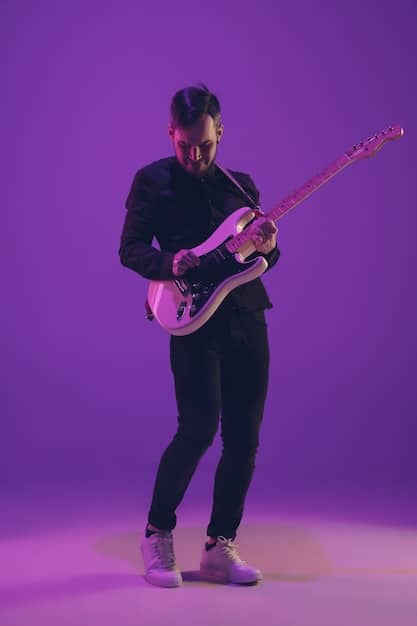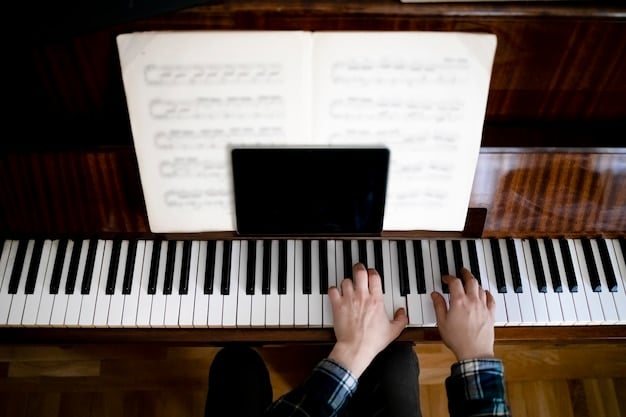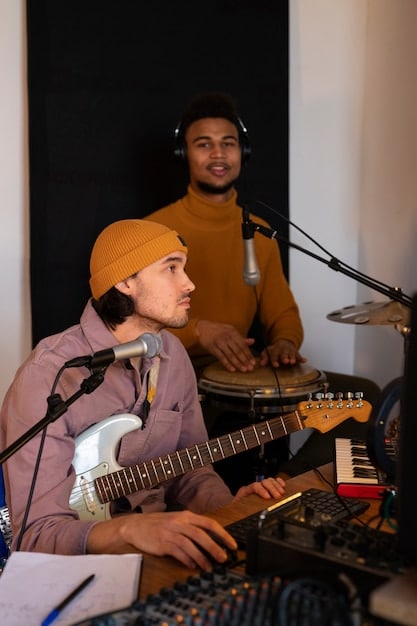Unlock Exclusive Music Grants: 7 Opportunities for US Musicians in 2025

Advertisements
Unlock Exclusive Music Grants: 7 Funding Opportunities for US Musicians in Early 2025 details seven key grant opportunities available for musicians in the US during early 2025, providing essential financial support and resources to elevate their careers.
Are you a musician in the US looking for funding opportunities to elevate your career? This comprehensive guide, Unlock Exclusive Music Grants: 7 Funding Opportunities for US Musicians in Early 2025, reveals seven essential grants that can provide the financial support and resources you need to take your music to the next level.
Understanding the Landscape of Music Grants in the US
Navigating the world of music grants can be overwhelming, but understanding the landscape is the first crucial step. This section provides an overview of what music grants are, why they are important, and what musicians need to know before applying.
What are Music Grants?
Music grants are financial awards given to musicians and music-related organizations to support various projects and activities. These grants can fund everything from album recordings and touring to music education programs and community outreach initiatives.
These grants are typically offered by government agencies, private foundations, and corporate sponsors, each with its own eligibility criteria and funding priorities. Understanding the different types of grants and their specific purposes is essential for targeting the right opportunities.
Why Music Grants Matter
Music grants play a vital role in sustaining the music industry and fostering creativity. For many musicians, securing funding can be the difference between pursuing their passion and being held back by financial constraints. These grants allow artists to focus on their craft, innovate, and contribute to the cultural landscape.
Grants also support community-based music programs, ensuring that music education and appreciation are accessible to all, regardless of socioeconomic background.

In conclusion, music grants in the US represent a lifeline for many musicians and music organizations, providing essential financial support that fuels creativity, innovation, and community engagement.
The American Society of Composers, Authors and Publishers (ASCAP) Grants
The American Society of Composers, Authors and Publishers (ASCAP) offers several grant programs designed to support songwriters, composers, and music publishers. These grants recognize talent and contributions to the music industry.
ASCAP Foundation Grants
The ASCAP Foundation provides grants to a wide range of music creators and organizations. These grants support educational programs, artistic development, and community outreach.
These grants focus on nurturing the next generation of music professionals and promoting diversity within the industry. The ASCAP Foundation also offers specific awards for emerging songwriters and composers.
- Eligibility: Open to ASCAP members and non-profit organizations.
- Funding Amount: Varies depending on the program and project.
- Application Deadline: Typically announced on the ASCAP Foundation website.
ASCAP Plus Awards
The ASCAP Plus Awards recognize the achievements of ASCAP members whose works are performed in media not surveyed by ASCAP, such as college radio, symphonic performances, and educational broadcasts. These awards provide additional income and recognition for deserving artists.
The ASCAP Plus Awards are an excellent opportunity for musicians and composers who create unique and innovative material that may not fit traditional commercial channels. Recipients receive direct financial support to help them continue their creative work.
The ASCAP grants offer vital support for music creators, fostering creativity and rewarding contributions to the industry. These programs provide diverse opportunities for musicians and organizations to thrive.
Meet the Composer Grants
Meet the Composer supports composers by fostering public engagement with their work. This organization offers grants for commissioning new music, residencies, and community engagement projects.
Commissioning Music USA
Commissioning Music USA provides grants to support the creation and performance of new musical works by American composers. This program encourages collaborations between composers and performing organizations.
Commissioning Music USA helps bring innovative musical ideas to life, enriching the repertoire of contemporary music and providing composers with valuable opportunities to showcase their talents.

- Eligibility: Composers must be US citizens or permanent residents.
- Funding Amount: Up to $15,000.
- Application Deadline: Varies annually; check the Meet the Composer website.
Creative Connections
Creative Connections supports composers in developing relationships with communities through residencies and engagement projects. This program promotes cultural exchange and mutual understanding through music.
Creative Connections allows composers to work closely with diverse audiences, creating meaningful musical experiences that resonate within the community. The program encourages innovative approaches to music education and engagement.
Meet the Composer grants play a vital role in cultivating new musical works and promoting composer engagement with communities across the US. These grants help composers realize their artistic visions and connect with audiences in meaningful ways.
The Aaron Copland Fund for Music
The Aaron Copland Fund for Music supports the creation, performance, and preservation of American music. This fund offers grants to non-profit organizations that promote and celebrate American composers and their works.
Performing Ensembles Program
The Performing Ensembles Program provides grants to performing organizations that feature American music in their concerts and recordings. This program encourages the performance of works by both established and emerging American composers.
The Performing Ensembles Program helps ensure that American music remains vibrant and accessible to audiences, enriching the cultural landscape and supporting the careers of American composers.
- Eligibility: Open to non-profit performing ensembles.
- Funding Amount: Varies; typically between $5,000 and $20,000.
- Application Deadline: Usually in January; check the Aaron Copland Fund website.
Recording Program
The Recording Program supports the creation of high-quality recordings of American music, helping to preserve and promote these works for future generations. This program encourages the documentation of significant contributions to the American musical heritage.
The Recording Program enables the preservation of important American music, expanding its reach and ensuring its availability for audiences worldwide. The program supports both commercial and non-commercial recording projects.
The Aaron Copland Fund for Music offers essential support for the performance, creation, and preservation of American music, contributing to the vibrancy and longevity of the national musical heritage.
The Chamber Music America Grants
Chamber Music America (CMA) offers grants to support chamber ensembles and presenters, fostering the development of chamber music across the US. These grants encourage artistic excellence, innovation, and community engagement.
Ensemble Forward Program
The Ensemble Forward Program provides grants to chamber ensembles for artistic planning, audience development, and organizational capacity building. This program helps ensembles enhance their artistic vision and connect with broader audiences.
The Ensemble Forward Program enables chamber ensembles to innovate and expand their reach, fostering a thriving chamber music ecosystem. The program supports a wide range of activities, from commissioning new works to developing educational programs.
- Eligibility: Open to professional chamber ensembles.
- Funding Amount: Up to $15,000.
- Application Deadline: Varies annually; see the Chamber Music America website.
Residency Program
The Residency Program supports chamber ensembles in developing meaningful residencies with communities and educational institutions. This program encourages collaboration and mutual learning between ensembles and their host communities.
The Residency Program allows ensembles to deeply engage with diverse audiences, enriching their musical experiences and fostering a greater appreciation for chamber music. The program supports residencies of varying lengths and formats.
Chamber Music America grants play a crucial role in supporting the growth and sustainability of chamber music in the US, enabling ensembles to thrive artistically and connect with communities in meaningful ways.
National Endowment for the Arts (NEA) Grants
The National Endowment for the Arts (NEA) provides grants to support a wide range of artistic disciplines, including music. NEA grants are highly competitive and prestigious, offering significant funding for impactful projects.
Grants for Arts Projects
Grants for Arts Projects support a wide variety of music-related initiatives, including performances, recordings, educational programs, and community engagement activities. This program encourages innovation and artistic excellence across the music sector.
Grants for Arts Projects help bring ambitious and impactful music projects to life, enriching the cultural landscape and providing audiences with exceptional artistic experiences. The program supports both individual artists and organizations.
- Eligibility: Open to non-profit organizations and individual artists.
- Funding Amount: Varies; typically between $10,000 and $100,000.
- Application Deadline: Multiple deadlines throughout the year; check the NEA website.
Our Town
Our Town supports creative placemaking projects that engage artists and designers in strengthening communities. This program encourages collaboration and innovation in revitalization efforts.
Our Town projects often incorporate music as a key element, using performances, workshops, and public art installations to bring communities together and celebrate their cultural heritage.
NEA grants provide vital support for a broad spectrum of music-related activities, fostering artistic excellence, community engagement, and cultural vibrancy across the US.
Regional Arts Organizations Grants
Regional Arts Organizations (RAOs) offer grant programs tailored to the specific needs and priorities of their respective regions. These organizations support artists and arts organizations within their geographic areas, promoting cultural diversity and regional identity.
Arts Midwest
Arts Midwest supports arts and cultural activities in Illinois, Indiana, Iowa, Michigan, Minnesota, North Dakota, Ohio, South Dakota, and Wisconsin. This RAO offers grants for touring, professional development, and community engagement.
Arts Midwest grants help artists and arts organizations in the Midwest connect with audiences, develop their skills, and strengthen their communities through the arts.
- Eligibility: Open to artists and arts organizations in the Arts Midwest region.
- Funding Amount: Varies depending on the program.
- Application Deadline: Multiple deadlines throughout the year; check the Arts Midwest website.
New England Foundation for the Arts (NEFA)
The New England Foundation for the Arts (NEFA) supports arts and cultural activities in Connecticut, Maine, Massachusetts, New Hampshire, Rhode Island, and Vermont. This RAO offers grants for project development, touring, and capacity building.
NEFA grants help artists and arts organizations in New England create impactful projects, reach new audiences, and strengthen their organizational capacity.
Regional Arts Organizations provide localized support for artists and arts organizations, fostering cultural diversity and promoting regional identity through targeted grant programs.
Tips for Applying for Music Grants
Applying for music grants can be a competitive process, but following these tips can increase your chances of success. This section provides practical advice on how to prepare a strong grant application, from researching opportunities to crafting a compelling narrative.
Research Potential Grants Thoroughly
Before you start writing your application, take the time to research potential grants thoroughly. Understand their mission, priorities, and eligibility criteria.
Review the grant guidelines carefully and make sure your project aligns with the funder’s objectives. Look at past recipients to get a sense of the types of projects they typically support.
- Read all guidelines carefully.
- Review past recipients.
- Attend informational webinars.
Craft a Compelling Narrative
Your grant application should tell a compelling story about your project and its potential impact
. Showcase the project’s artistic merit, community engagement, and long-term sustainability. Use concrete examples and data to illustrate your points.
Explain how your project addresses a specific need or problem in the community and how it will make a positive difference. Highlight the unique aspects of your project and why it deserves funding.
Securing music grants requires careful planning, attention to detail, and a clear understanding of the funder’s priorities. By following these tips, you can increase your chances of success and unlock the financial resources you need to elevate your music career.
| Key Point | Brief Description |
|---|---|
| 🎵 ASCAP Grants | Supports songwriters and composers. |
| 🎼 Meet the Composer | Funds new musical works and community engagement. |
| 🎻 Aaron Copland Fund | Focuses on American music performance and preservation. |
| 🎭 NEA Grants | Supports various arts projects, including music. |
Frequently Asked Questions (FAQs)
▼
Music grants often fund a wide range of projects, including album recordings, live performances, music education programs, community outreach initiatives, and composition of new musical works. The exact types vary by grant.
▼
Start by researching databases of grants, such as those provided by the NEA, ASCAP, and regional arts organizations. Also, network with other musicians and arts professionals for leads and recommendations.
▼
A successful application typically includes a clear project description, a compelling narrative, a detailed budget, evidence of your qualifications, and strong letters of support. Make sure to follow all instructions carefully.
▼
Tailoring your application to the specific grant is crucial. Demonstrate how your project aligns with the funder’s mission and priorities, and address any specific requirements or guidelines they have.
▼
Don’t be discouraged. Ask the funder for feedback on your application, and use this feedback to improve future applications. Consider applying for smaller grants to build your track record.
Conclusion
Navigating the landscape of music grants in the US requires diligence, research, and a compelling narrative. By exploring the opportunities offered by organizations like ASCAP, Meet the Composer, and the NEA, US musicians can unlock vital funding to fuel their creative endeavors and contribute to the rich tapestry of American music.





